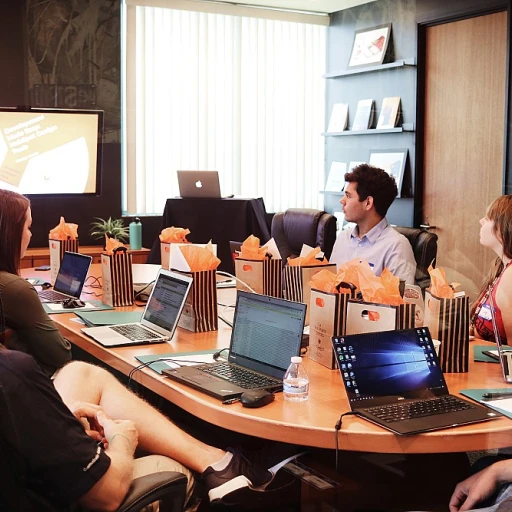
Understanding the Need for Reskilling
The Urgency of Adapting to a Changing Job Market
The rapidly changing landscape of the job market has amplified the need for reskilling. As industries evolve, certain skills become obsolete, demanding that both young and seasoned professionals adapt. In fact, what was relevant five years ago might now be seen as outdated information.
For young adults, especially those from low-income backgrounds, the path to employment often requires more than a high school diploma. In a world where a college degree no longer guarantees job security, there is an urgent need to explore alternative programs that offer skills training and full-time development opportunities.
Every year, students confront the reality of a high-demand job market that expects them to be career ready. Whether they are enrolled in college or seeking job training programs, the focus is on gaining employable skills. Furthermore, training programs such as Year Up provide support and services tailored to the needs of young people.
It's not just about finding a job, but about securing long-term career readiness. Programs like Year Up offer a year of training, career services, and job placement support, helping young adults bridge the gap between education and employment. However, as we move forward, exploring a variety of options and resources will become essential.
Key Features of Successful Reskilling Programs
Essential Elements of Effective Reskilling Strategies
To truly understand the landscape of reskilling programs, it’s key to identify the common elements that contribute to their success. These features not only help align with the urgent need for career-oriented training in today's competitive job market but also ensure students, particularly young adults from various backgrounds, can transition smoothly from education to employment.- Comprehensive Curriculum: Programs must provide a robust curriculum that covers both technical and soft skills, essential for young individuals transitioning from high school to college or into the workforce. An effective curriculum merges skills development with job training to enhance career readiness.
- Employment Opportunities: A successful reskilling initiative often includes job placement services. Assisting students in finding full-time positions post-training supports long-term career sustainability. For example, individuals might benefit from programs offering job training coupled with career services.
- Support Services: Effective training programs must offer support beyond traditional coursework. This includes academic support, mentorship, and access to resources that help students from low-income and diverse backgrounds manage the time commitment and costs associated with full-time programs.
- Industry Partnerships: Collaborations with companies ensure that the training provided aligns with real-world industry demands. Development of practical skills through apprenticeships or internships helps connect young people to job markets, whether in a bustling metropolis like York City or elsewhere.
- Continuous Evaluation: Maintaining flexibility through continuous assessment allows training programs to adapt to the changing needs of both students and the job market. This approach ensures that the program stays relevant and provides high returns in terms of employment rates.
Exploring Programs Similar to Year Up
Comparing and Contrasting Reskilling Opportunities
When embarking on a path of reskilling, exploring a variety of training programs that cater to different needs and career aspirations is essential. While Year Up is a remarkable initiative providing extensive support to young adults, numerous other programs offer similarly beneficial outcomes across employment, skills training, and job placement.
A key aspect of these programs revolves around providing comprehensive training that bridges educational gaps. Many initiatives focus on developing skills that align with current job market demands, often including career services and job readiness training. Programs may vary considerably in their approach, scale, and target audience, but all aim to prepare individuals for long-term success in their chosen careers.
Reskilling programs similar to Year Up often offer:
- Career Services and Support: These services play a crucial role in ensuring successful career transition, offering young adults the tools needed for securing stable employment or furthering their education through college enrollment.
- Inclusivity and Diversity: Many of these initiatives focus on young people from low-income backgrounds, providing equitable access to opportunities for those who might not have them otherwise.
- Flexibility in Delivery: Programs might offer part-time, full-time, or evening classes, allowing students to balance their time effectively alongside existing commitments, be it work or family.
Reskilling opportunities extend beyond just practical skills; they also offer development and mentoring, helping participants build a robust support network. This community aspect fosters a sense of belonging and motivation, which is vital for long-term professional growth.
Whether you're a high school graduate in New York City or a young professional considering post-secondary training, there is likely a program that fits your needs. Evaluating the offerings based on your personal goals will be crucial in choosing the most suitable training program for career advancement.
Assessing Program Suitability
Determining the Right Program Mix for Your Journey
When considering your reskilling journey, it’s crucial to assess the suitability of potential training programs. This involves taking stock of several key aspects unique to your circumstances and aspirations. Here's a focused approach to evaluating which reskilling path aligns best with your needs:
- Career Objectives: Understand where you want your career to head. Whether it's a transition or deepening existing skills, clarity in career goals will influence program choice.
- Program Structure: Investigate if the program offers flexibility in either full-time or part-time formats, essential for those balancing other commitments such as employment, family, or college enrollment.
- Resource Availability: Map out the level of resources available to you, including time, financial investment, and support systems. Some programs might offer job placement or career services; consider if these align with your expectations.
- Target Audience Fit: Many programs are designed with specific demographics in mind, such as young adults, high school graduates, or low-income individuals. Ensure the program caters to your background and requirement set, as some initiatives are tailored for young people making their first entrance into the job market.
- Skill Relevance: Cross-examine the curriculum with your desired job role. Does the training program update its content to keep up with evolving industry standards and demands? Skills training should facilitate your immediate and long-term career enhancements.
Each training program heralds its unique suite of benefits. However, the decision ultimately rests on aligning these features with your personal and professional development goals. Keeping these considerations in mind can help ensure that your investment in time and effort yields the best outcomes in terms of career readiness and advancement.
Challenges in Reskilling and How to Overcome Them
Overcoming Barriers in the Reskilling Journey
Reskilling is an essential pathway for many young adults and career changers, yet it comes with its own set of challenges. Understanding these obstacles and how to tackle them is crucial for anyone looking to transition into a new career or enhance their current skills.
Time Management and Commitment
One of the primary challenges is managing time effectively, especially for those juggling full-time work, family responsibilities, or other commitments. Balancing a training program with existing obligations requires strategic planning and often, a significant shift in priorities. Many programs offer flexible schedules, including part-time and online options, to accommodate the diverse needs of students. It's important to assess your schedule realistically and choose a program that aligns with your availability.
Financial Constraints
Cost can be a significant barrier, particularly for low-income individuals. While some programs, like Year Up, offer financial support or are free of charge, others may require tuition fees. Exploring financial aid options, scholarships, and employer-sponsored training can alleviate some of the financial burdens. Additionally, some programs offer job placement services, which can provide a quicker return on investment by facilitating employment post-training.
Access to Resources and Support
Having access to necessary resources, such as technology and internet connectivity, is crucial for successful participation in reskilling programs. Some programs provide resources or partnerships with organizations that offer support services. It's also beneficial to connect with a support group or network, whether through the program itself or external platforms, to share experiences and advice.
Maintaining Motivation and Focus
Staying motivated over the long term can be challenging, especially when progress seems slow or obstacles arise. Setting clear, achievable goals and celebrating small victories along the way can help maintain focus. Career services and mentorship offered by many training programs can provide guidance and encouragement, helping students stay on track.
By addressing these challenges head-on and utilizing available resources, individuals can successfully navigate the reskilling process and move towards fulfilling employment opportunities.













